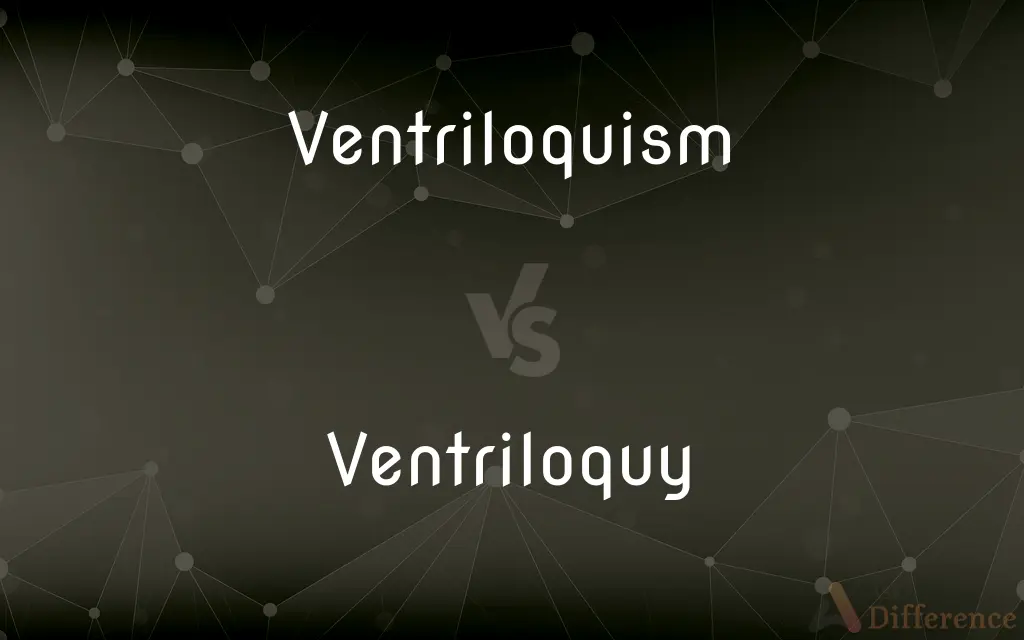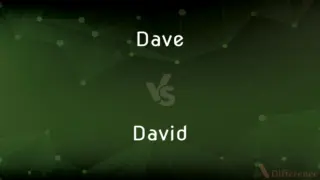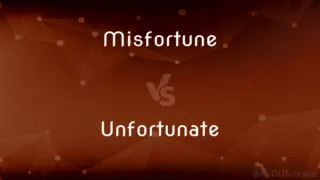Ventriloquism vs. Ventriloquy — What's the Difference?
By Tayyaba Rehman & Urooj Arif — Updated on April 27, 2024
Ventriloquism involves the art of voice manipulation to make it seem like a puppet is speaking, while ventriloquy refers to the skill of speaking without moving the lips.

Difference Between Ventriloquism and Ventriloquy
Table of Contents
ADVERTISEMENT
Key Differences
Ventriloquism is primarily seen as a performance art, where entertainers use puppets or dummies to create the illusion of life and voice emanating from them, whereas ventriloquy focuses specifically on the technique of speaking in a way that minimizes lip movement, making the voice appear to come from elsewhere.
In ventriloquism, the emphasis is often on interaction with the audience and the puppet, using humor and dialogue to engage viewers; on the other hand, ventriloquy is more about the technical aspect of producing clear speech without visible lip movements, which can be employed in various settings, including ventriloquism but also in other forms of entertainment or even magic.
Ventriloquists are typically skilled in puppetry and character development, creating distinct personalities for their dummies, whereas ventriloquy may not necessarily involve characters but rather focuses on the vocal technique.
The practice of ventriloquism can be traced back to religious practices where voices were projected as coming from idols or other objects, while ventriloquy has been used historically for practical jokes or as a novelty in performance settings.
Training for ventriloquism usually includes learning ventriloquy, but mastering ventriloquism also involves theatrical skills like timing, puppet manipulation, and audience interaction, whereas mastering ventriloquy alone might not require these additional performance skills.
ADVERTISEMENT
Comparison Chart
Definition
Art of making a puppet appear to talk
Art of speaking without moving the lips
Focus
Puppetry and performance
Technique of speech
Skills Required
Puppet manipulation, character development, comedy
Precision in speech production
Historical Use
Entertainment and religious practices
Entertainment and practical jokes
Performance Aspect
Interactive and engaging for audiences
Focused on speech technique
Compare with Definitions
Ventriloquism
A performing art using dummies to simulate conversation.
The ventriloquist amazed the audience with her lively dummy.
Ventriloquy
The skill of speaking without moving lips.
His ventriloquy was so seamless, it was hard to tell he was speaking.
Ventriloquism
Combines storytelling with puppetry.
The ventriloquist used her dolls to tell an enchanting story.
Ventriloquy
Useful in various forms of entertainment.
The magician used ventriloquy to enhance his act.
Ventriloquism
Involves creating distinct voices for characters.
He developed a gruff voice for his puppet.
Ventriloquy
Often used by ventriloquists in their acts.
She practiced ventriloquy to improve her stage performance.
Ventriloquism
Often incorporates humor and interaction.
Her ventriloquism act had the crowd laughing.
Ventriloquy
Focuses on controlling vocal sounds.
Mastering ventriloquy requires control over one's voice.
Ventriloquism
Requires the ability to throw one's voice.
She perfected her skill to throw her voice across the room.
Ventriloquy
Can be used to create illusions of voices from objects.
He used ventriloquy to make the statue seem to talk.
Ventriloquism
Ventriloquism, or ventriloquy, is an act of stagecraft in which a person (a ventriloquist) creates the illusion that their voice is coming from elsewhere, usually a puppeteered prop, known as a "dummy". The act of ventriloquism is ventriloquizing, and the ability to do so is commonly called in English the ability to "throw" one's voice.
Ventriloquy
Ventriloquism.
Ventriloquism
The art of projecting one's voice so that it seems to come from another source, as from a wooden figure.
Ventriloquy
(dated) Ventriloquism.
Ventriloquism
The art of projecting one's voice without moving the lips so that it appears to come from another source, such as a dummy.
Ventriloquy
Same as Ventriloquism.
Ventriloquism
The act, art, or practice of speaking in such a manner that the voice appears to come, not from the person speaking, but from some other source, as from a dummy held by the ventriloquist, from the opposite side of the room, from the cellar, etc.
Ventriloquy
The art of projecting your voice so that it seems to come from another source (as from a ventriloquist's dummy)
Ventriloquism
The art of projecting your voice so that it seems to come from another source (as from a ventriloquist's dummy)
Common Curiosities
Do all ventriloquists use ventriloquy?
Yes, ventriloquy is a fundamental skill for ventriloquists.
Can ventriloquy be used outside of ventriloquism?
Yes, ventriloquy can be used in other forms of entertainment or to create unique effects in performances.
Is ventriloquy difficult to learn?
Yes, it requires practice to speak clearly without moving the lips, making it a challenging skill to master.
How do ventriloquists make their puppets seem alive?
Ventriloquists combine voice throwing with puppet manipulation and character development to make their puppets appear alive.
Is ventriloquism considered a form of entertainment?
Yes, ventriloquism is primarily considered a form of entertainment, with ventriloquists performing in various settings including theaters, television, and comedy clubs.
Can anyone learn ventriloquism?
While some individuals may have a natural talent for ventriloquism, with practice and dedication, most people can learn the techniques involved in throwing their voice effectively.
What is the main difference between ventriloquism and ventriloquy?
Ventriloquism is the art of making a puppet speak as part of a performance, while ventriloquy is the technique of speaking without moving the lips.
Is ventriloquism still popular today?
Yes, ventriloquism continues to be a popular form of entertainment, with contemporary performers incorporating modern humor and technology into their acts.
What are some famous ventriloquists?
Famous ventriloquists include Edgar Bergen, Shari Lewis, and Jeff Dunham, among others, who have gained recognition for their skillful performances.
Are there any cultural or religious associations with ventriloquism?
Historically, ventriloquism has been associated with various cultural and religious practices, including rituals involving spirit communication and divination.
Share Your Discovery

Previous Comparison
Dave vs. David
Next Comparison
Misfortune vs. UnfortunateAuthor Spotlight
Written by
Tayyaba RehmanTayyaba Rehman is a distinguished writer, currently serving as a primary contributor to askdifference.com. As a researcher in semantics and etymology, Tayyaba's passion for the complexity of languages and their distinctions has found a perfect home on the platform. Tayyaba delves into the intricacies of language, distinguishing between commonly confused words and phrases, thereby providing clarity for readers worldwide.
Co-written by
Urooj ArifUrooj is a skilled content writer at Ask Difference, known for her exceptional ability to simplify complex topics into engaging and informative content. With a passion for research and a flair for clear, concise writing, she consistently delivers articles that resonate with our diverse audience.














































